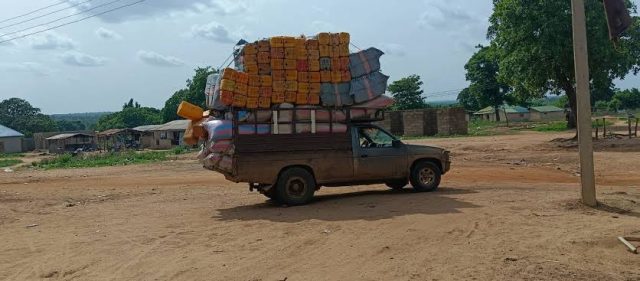Petrol smuggling from Nigeria to the Benin Republic is thriving along the Saki-Okerete border in Oyo State, despite a federal ban on the movement of goods across the crossing, a report by the International Centre for Investigative Reporting (ICIR) has revealed.
The border is officially open for human movement but closed to goods. However, its report documented how thousands of 30-litre kegs of petrol leave the Nigerian town of Saki daily, carried by cars and motorcycles, to be sold at higher prices in Benin.
While a litre of petrol sells for N900–N950 in Nigeria, the price in Benin is 550 CFA francs, equivalent to about N1,435 creating profit margins of up to 60 per cent for traders.
Moshood, a former mechanic in Saki, said he now earns about N400,000 a month from smuggling petrol and other goods to Benin.
“I had worked as a mechanic for about ten years with nothing meaningful to show for it,” he said. “Then I realised my friends were building houses by transporting goods across the border.”
Petrol is transported mainly in yellow 30-litre plastic kegs, commonly used for vegetable oil in Nigeria. Motorcyclists carry up to a dozen kegs at a time, tied to both sides of their bikes and strapped across the seat.
Most vehicles stop at Okerete, the last Nigerian settlement before Benin, but motorcycles travel deeper into Beninese territory, often returning with rice which is roughly half the price in Benin compared to Nigeria.
Economists interviewed, including former Lagos Chamber of Commerce and Industry director Muda Yusuf, said the trade is fuelled by the depreciation of the naira against the CFA franc, and contributes to rising food and fuel costs in Nigeria.
The Saki-Okerete route is one of several unofficially active borders. Former defence chief Lucky Irabor said in 2022 that northern Nigeria alone had 137 unmanned border points out of 261 approved crossings. Current defence chief Christopher Musa has called for fencing the borders, citing examples from other countries, but sceptics say it would be too costly.
It was observed that bribery allows smugglers to operate freely. Travellers without valid documents pay N1,000 to Nigerian immigration officials and N1,500 to their Beninese counterparts to pass without checks. Neither side inspects the goods once payment is made.
Vehicles used in the trade are typically reinforced Peugeot 504s, modified to carry heavy loads and passengers simultaneously. Some cars transport up to 10 people sitting atop cargo. Despite frequent breakdowns and the poor state of the Saki-Okerete road, traders continue due to the high profits.
At Okerete, a Sunday market serves as a hub where Nigerian petrol and other goods are sold to buyers from Benin. Local traders told reporters that the market is essential for their livelihoods, but acknowledged that the business violates Nigerian trade restrictions.
Nigeria’s border closures began in 2019 under then-president Muhammadu Buhari, aimed at boosting local production. Some crossings were reopened in 2020, but the Saki-Okerete border remains officially closed to goods.
A 2023 report estimated that Nigeria loses around N60 billion annually to unregulated trade at its borders. The report indicates that petrol smuggling from Saki to Benin is a major contributor to these losses.
For many in Saki, the trade is a pathway out of poverty. For the Nigerian government, it remains a persistent drain on resources and a challenge to border enforcement.







